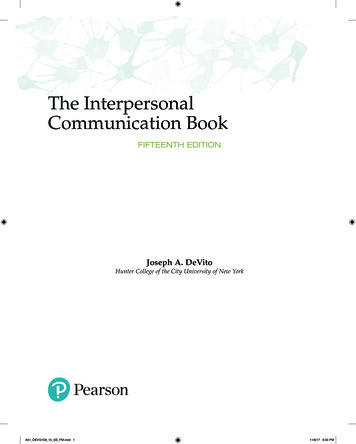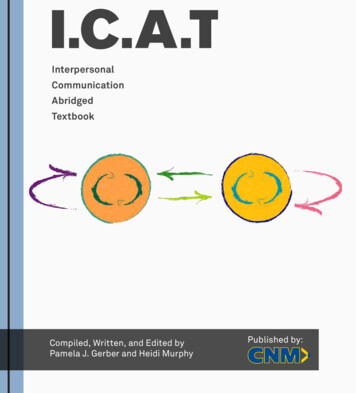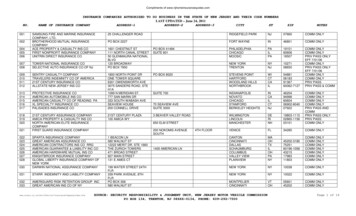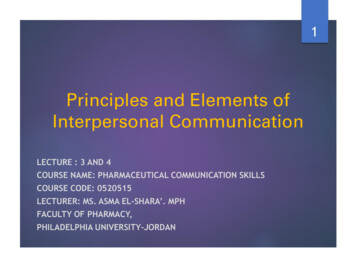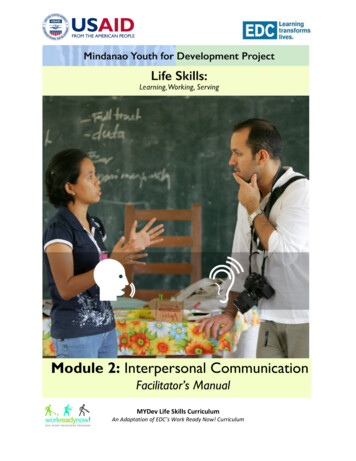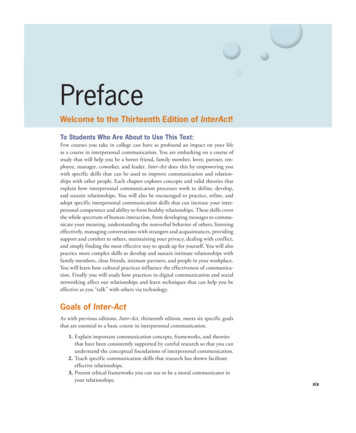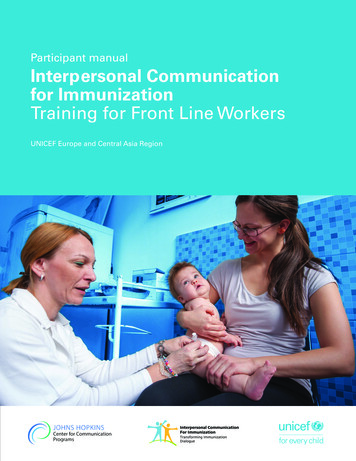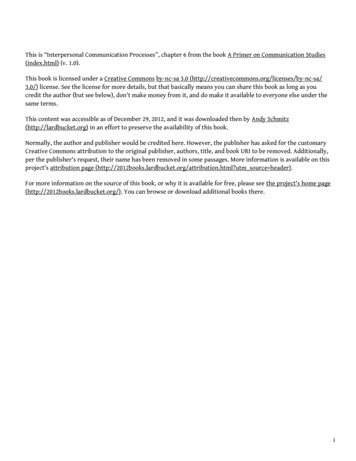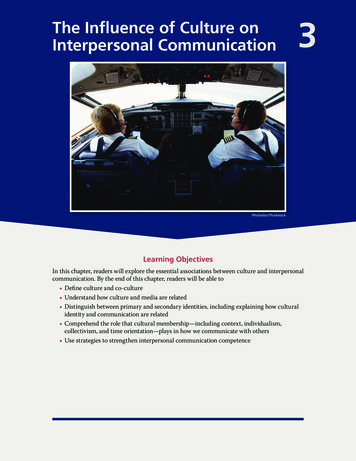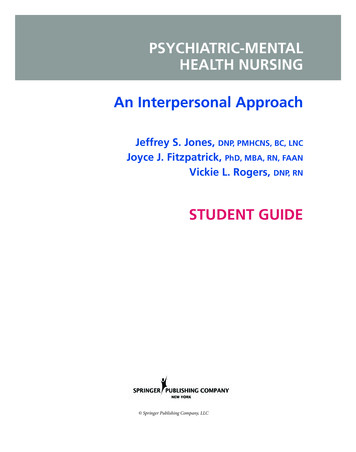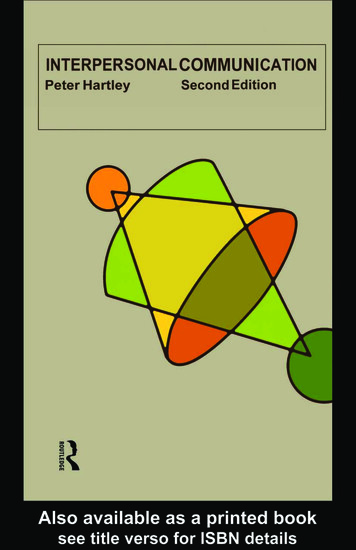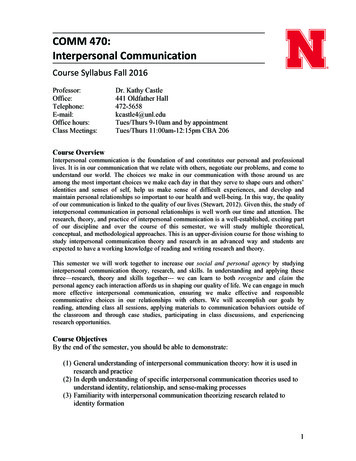
Transcription
COMM 470:Interpersonal CommunicationCourse Syllabus Fall 2016Professor:Office:Telephone:E-mail:Office hours:Class Meetings:Dr. Kathy Castle441 Oldfather Hall472-5658kcastle4@unl.eduTues/Thurs 9-10am and by appointmentTues/Thurs 11:00am-12:15pm CBA 206Course OverviewInterpersonal communication is the foundation of and constitutes our personal and professionallives. It is in our communication that we relate with others, negotiate our problems, and come tounderstand our world. The choices we make in our communication with those around us areamong the most important choices we make each day in that they serve to shape ours and others’identities and senses of self, help us make sense of difficult experiences, and develop andmaintain personal relationships so important to our health and well-being. In this way, the qualityof our communication is linked to the quality of our lives (Stewart, 2012). Given this, the study ofinterpersonal communication in personal relationships is well worth our time and attention. Theresearch, theory, and practice of interpersonal communication is a well-established, exciting partof our discipline and over the course of this semester, we will study multiple theoretical,conceptual, and methodological approaches. This is an upper-division course for those wishing tostudy interpersonal communication theory and research in an advanced way and students areexpected to have a working knowledge of reading and writing research and theory.This semester we will work together to increase our social and personal agency by studyinginterpersonal communication theory, research, and skills. In understanding and applying thesethree—research, theory and skills together--- we can learn to both recognize and claim thepersonal agency each interaction affords us in shaping our quality of life. We can engage in muchmore effective interpersonal communication, ensuring we make effective and responsiblecommunicative choices in our relationships with others. We will accomplish our goals byreading, attending class all sessions, applying materials to communication behaviors outside ofthe classroom and through case studies, participating in class discussions, and experiencingresearch opportunities.Course ObjectivesBy the end of the semester, you should be able to demonstrate:(1) General understanding of interpersonal communication theory: how it is used inresearch and practice(2) In depth understanding of specific interpersonal communication theories used tounderstand identity, relationship, and sense-making processes(3) Familiarity with interpersonal communication theorizing research related toidentity formation1
COMM 470:Interpersonal CommunicationCourse Syllabus Fall 2016(4) Familiarity with interpersonal communication theorizing and research related torelationship development and maintenance(5) Familiarity with interpersonal communication theorizing and research related tosense-makingRequired Textbooks:Braithwaite, D.O. & Schrodt, P. (2015). Engaging theories in interpersonalcommunication: Multiple perspectives. Los Angeles, CA: Sage.Braithwaite, D.O., & Wood, J.T. Casing interpersonal communication. Case studies inpersonal and social relationships. Dubuque, IA. Kendall Hunt Publishing(available as an e-book from the publisher online)Required Reading Packet Will Be Provided Online Including Excerpts From:(you can print if you wish at your expense)Griffin, E., Ledbetter, A., & Sparks, G. (2015). A first look at communication theory.New York, NY: McGraw-Hill.Guerrero, L.K., Andersen, P.A., & Afifi, W.A. (2014). Close encounters:Communication in relationships. Los Angeles, CA: SageSmith, S.W., & Wilson, S.R. (2010). New directions in interpersonal communicationresearch. Los Angeles, CA: Sage Publications.Required Reading Pack Will Also Include These Peer Reviewed Articles:Danielson, C.M., & Emmers-Sommers , T.M. (2016). “It was my fault”: Bullied students’attributions in bullying blogs. Journal of Health Communication, 21, 408-414.doi: 10.1080/10810730.2015.1095817Hecht, M.L., & Miller Day, M. (2007). The drug resistance strategies project astranslational research. Journal of Applied Communication Research, 35, 343-349.doi: 10.1080/00909880701611086Miller-Day, M., & Hecht, M.L. (2013). Narrative means to preventative ends: a narrativeframework for designing prevention interventions. Health Communication, 28,657-670. doi: 10.1080/10410236.2012.7628612
COMM 470:Interpersonal CommunicationCourse Syllabus Fall 2016Wagner, P.E., Kunkel, A., & Compton, B.L. (2016). (Trans)lating identity: Exploringdiscursive strategies for navigating the tensions of identity gaps. CommunicationQuarterly, 64, 251-272. doi: 10.1080/01463373.2015.1103286Zhang, S., & Stafford, L. (2008). Perceived face threat of honest but hurtful evaluativemessages in romantic relationships. Western Journal of Communication, 72, ------------Mission Statement of the Department of Communication --------------The mission of the faculty and students of the Department of Communication Studiesis to examine human symbolic activity as it shapes and is shaped by relationships,institutions, technology, and culture. This work concerns the creation, analysis, andcritique of messages ranging from face-to-face to digital media contexts.The department’s research and teaching devote particular attention to scholarlyinitiatives aimed at understanding and explaining the role of communication in (a)facilitating civic engagement, mediating public controversies, and organizing forsocial change, (b) constituting individual and family health, promoting healthybehaviors, and helping persons navigate relational challenges, and (c) creating,maintaining, and challenging personal, social, and community identity in a complexand diverse ------Learning Management System: ------This semester, this course will be taught using the Canvas learning managementsystem. You may have experience using the Blackboard LMS (known on this campusas MyUNL). Canvas is a system that offers many of the same tools as Blackboard.UNL is piloting the Canvas system this semester to determine if all UNL coursesshould switch from Blackboard to Canvas.When you login to this course’s Blackboard site, you will see that there is no contentthere – only a link that will direct you to Canvas. You can access Canvas by going tocanvas.unl.edu. When you do, you can login using the same username and passwordyou typically use to login to Blackboard. Once you login to this course’s Canvas site,you will see that there is a module in the course dedicated called Intro to Canvas.This section will provide an overview of the Canvas LMS, give you access to3
COMM 470:Interpersonal CommunicationCourse Syllabus Fall 2016resources about Canvas, and provide you with information about how to get helpusing -------Course -------------------Required Reading. The assigned reading is one of the cornerstones of learning in thiscourse. Thus, I expect you to come to class prepared to discuss the assigned materials.This means that you have completed the reading assignments for that day and have givensome thought as to how this material relates to your personal, professional, and academicpursuits. Students should be prepared every class period to discuss their insights about theassigned material.Attendance and Participation. Another cornerstone of learning is active engagement.Thus, it is important that students come to class and be actively involved in classdiscussions – in other words, I expect each of you to contribute to our learning experiencein COMM 470. In addition to taking notes (when needed), I expect each of you tocontribute your understanding of the material as it relates to your academic, professional,and personal experiences. I also expect each of you to listen with an open mind andrespect the opinions of others in class. In the event you must miss class due tounavoidable circumstances, please contact a reliable classmate for notes, handouts andhis/her insights about that day’s discussion.Perspectives. We may be exposed to perspectives different than our own in our readings,class experiences, or from what class members discuss in the class. Class members areasked to treat respectfully the opinions and experiences of others in the class. One doesnot need to agree with another person to be able to treat them respectfully. Please talkwith the professor if you have concerns.Assignment Submission and Deadlines. Meeting deadlines is very important and is anexpectation in this course. All assignments are due before the start of class on theassigned day. All assignments should be submitted via the Canvas Learning ManagementSystem AND turned in via hard copy at the start of the class on which the assignment isdue. Late assignments will be docked 10% of the total point possible for every calendarday they are late, beginning the minute class begins on the date the assignment was due.Assignments will not be accepted more than four calendar days past the due date.Exams and in-class point-bearing assignments missed due to an excused absence must bemade up no later than 1 week following the excused absence, at the convenience of yourinstructor (in office hours, by appointment, etc). Failure to make assignments up within 1week of the excused absence will result in a loss of the opportunity to make up the4
COMM 470:Interpersonal CommunicationCourse Syllabus Fall 2016assignment and will result in a zero. Exams and assignments missed due to an unexcusedabsence cannot be made up.Academic Honesty. Academic honesty and integrity are expected in this course. Anystudent who is found to have engaged in an act of academic dishonesty (e.g., cheating,plagiarism, complicity, misrepresenting excuses for missing class for turning in latework) will automatically fail the assignment. Additionally, he or she may fail the courseand/or be reported to his or her academic advisor and the Dean for further action.Ignorance of the rules is not an excuse for academic dishonesty. Please read Article 3,SectionB -1 of the UNL Student Code of ) for definitions of what constitutes academic dishonesty. If youhave questions, please come to talk with me before engaging in behavior that could beconstrued as academic dishonesty.Plagiarism: Given the number of written assignments required for this course, it isvery important that you understand what plagiarism is and do what is necessary toavoid engaging in it. The use of any uncited sources, presenting someone else’swords or ideas as your own, using falsified sources, or submitting someone else’swork as your own and/or submitting work that is not original for this course thissemester constitutes plagiarism. Further, improperly citing sources constitutesplagiarism. Thus, for all written assignments, I expect you to cite you sourcesaccording to the 6th edition of the American Psychological Association’s (APA)Style Manual. More importantly, be very clear when you are quoting vs.paraphrasing sources. If you have questions, please talk with me.Technology. Please turn off cell phones while present in class.Pass/No Pass Option. If you have elected the pass/no pass option in this course, youmust receive at least a grade of “C” in order to pass. A grade of “C” also is needed inorder to count this course toward your major. If you are taking this course to fulfill therequirements for a Communication Studies major or minor, you must take the course fora grade.Statement of Special Needs Accommodation. Students with disabilities areencouraged to contact the instructor for a confidential discussion of their individualneeds for academic accommodation. It is the policy of the University of NebraskaLincoln to provide flexible and individualized accommodation to students withdocumented disabilities that may affect their ability to participate fully in courseactivities or to meet course requirements. To receive accommodation services,5
COMM 470:Interpersonal CommunicationCourse Syllabus Fall 2016students must be registered with the Services for Students with Disabilities (SSD)office, 132 Canfield Administration, (402) 472-3787 voice or TTY.Assignments, Exams, and Quizzes: Your final grade will be determined based on yourperformance on the following. You are expected to read all assignment descriptions,grade rubrics, and pay attention to your in-class instructions for all assignments. Eachassignment is an assessment of your mastery of and ability to connect key ideas andconcepts presented in class via the textbook, other assigned readings, lectures, and inclass discussions as directed in the assignment description. You are encouraged to workwith me to clarify questions prior to completing your work Full details for eachassignment will be posted on Blackboard. You are expected to do your best work on eachtest and assignment.Course Engagement Points (30pts). Over the course of the semester, you will be givenopportunities in class to demonstrate your engagement with the course readings andconcepts. These opportunities will come in the form of in-class reading quizzes overassigned material, successful completion of in-class activities that require demonstratingyour understanding of the day’s assigned reading, or they may be opportunities to explainhow you have applied course concepts to situations outside the classroom. These areunannounced and cannot be made up—you must be present in class and prepared havingread the assigned material on the days they are administered in order to earn them.Exams (3 @ 100 points each). Three exams will be administered in this course. Theseexams will be short answer and essay and will test your comprehension of the vocabularyof interpersonal communication theory and research as well as your ability to applyinterpersonal communication theories and concepts to interpersonal cases and situations.Team Theory Presentations (50 pts). One objective of this class is to familiarize youwith specific theories that guide interpersonal communication research and practice.Thus, in assigned teams, you will choose a particular theory of interpersonalcommunication to learn about, apply, and teach it to the class on the designated day.6
COMM 470:Interpersonal CommunicationCourse Syllabus Fall 2016Interpersonal Communication Interest Paper (100 points). A key objective of thisclass is to familiarize you with communication theory and research centered oninterpersonal communication processes. Further, one goal I have for you in studyinginterpersonal communication processes is understanding how these processes shapethe overall health, well-being, and quality of life of people across populations. Thus,you will write a paper on an area of interpersonal communication research that is ofinterest to you that includes a literature review of a particular area of IPC.Translating Your Knowledge: Final Project (100 points). Working either on yourown or with a partner, you will be asked to produce an in-depth proposal for aresearch project OR a translational project aimed at improving communicationprocesses in a specific population. Details to --------------Grading Criteria for all Written -----------------There are a variety of writing assignments in this course aimed at helping you to engageinterpersonal communication theory and research. All of these assignments providepractice working with the language of interpersonal communication as you connect theideas being learned in class to your own experiences and research interests. Your work onthese assignments also lets me know how well you are understanding the coursematerials. In addition to assessing how well a written assignment meets key requirementsand demonstrates your understanding of key ideas, when grading written assignments, Igenerally look for four things:1. Does the paper illustrate a good understanding of key concepts and ideas?2. Does the paper demonstrate an ability to synthesize key ideas and concepts inways that enable an in depth, nuanced understanding of the content area?3. Does the paper demonstrate a developing expertise in the content area?4. Is the paper reasonably well written? Are ideas clearly presented? Is the paperrelatively free of typos and grammatical --------------Total Points and Final -------------It is possible to earn a total of 580 points in this class. You can use the following to keeptrack of your points:Course Engagement PointsExam 1Exam 2Exam 3(30 points total)(100 points)(100 points)(100 points)7
COMM 470:Interpersonal CommunicationCourse Syllabus Fall 2016Team Theory PresentationInterpersonal Communication Interest PaperTranslating Your Knowledge(50 points)(100 points)(100 points)TOTAL(580 points)Here is the grading scale for the 7-7973-7670-7267-6963-6660-62less than 60Minimum Points569540522505482464447424406389366348347 or lessGradeA AAB BBC CCD DDF8
COMM 470:Interpersonal CommunicationCourse Syllabus Fall 2016TENTATIVE SCHEDULEDateCourse ContentAssignments/Readings DueTheory in Interpersonal CommunicationTuesday8/23Course Overview: LearningObjectives, Course iew of IPC TheoryTuesday8/30Foundations:What is Theory?Ch 1 and 2 Em, Griffin, & Ledbetter (2015)Thursday9/1Foundations:IPC and RelationshipsCh 1 Guerrero, Andersen, AfifiForward and Ch 1 Braithwaite & SchrodtInterpersonal Communication and IdentityTuesday9/6Communicating /20Thursday9/22Ch 2 Guerrero, Andersen & Afifi pp. 25-35Ch 2 Guerrero, Andersen, & Afifi pp. 35-52Communication Theory of IdentityCh 13 Braithwaite & ShrodtWagner, Kunkel, & Compton (2016)Read Case From Case Book-Assigned in ClassFace Theory and Politeness TheoryCh 17 Braithwaite & SchrodtCh 20 Braithwaite & ShrodtZhang & Stafford (2008)Read Case From Case Book-Assigned in Class9
COMM 470:Interpersonal CommunicationCourse Syllabus Fall 2016Tuesday9/27Readings TBATeam 1 Theory PresentationTeam 2 Theory PresentationExam 1: Theory and Identity and IPCThursday9/29Interpersonal Communication in RelationshipsTuesday10/4Changing Relationships: Stages,Turning Points, and DialecticsCh. 5 Guerrero, Andersen, & Afifi pp.105-119Thursday10/6Changing Relationships:Stages, Turning Points, andDialecticsRelational Dialectics TheoryCh. 5 Guerrero, Andersen, & Afifi pp. day11/8Thurs11/10Relational Dialectics TheoryCh 21 Braithwaite & Schrodt (2015)Baxter & Braithwaite (2010)Read the Case from Case book- Assigned in ClassFALL BREAK-NO CLASSFALL BREAK-NO CLASSRelational Turbulence ModelCh 28 Braithwaite & Schrodt (2015)Solomon, Weber, & Steuber (2010)Relational Turbulence ModelRead Case From Case Book- Assigned in ClassReadings TBATeam 3 Theory PresentationTeam 4 Theory PresentationExam 2: Interpersonal Communication andRelationshipsInterpersonal Communication and Sense-MakingMaking Sense of Our WorldCh 4 Guerrero, Anderson & Afifi pp.80-92Making Sense of Our WorldNCA-NO CLASSCh 4 Guerrero, Anderson, & Afifi pp. 92-103Interpersonal Interest Paper DueNCA-NO CLASSWork on Final Paper10
COMM 470:Interpersonal CommunicationCourse Syllabus Fall 2016Tuesday11/15Attribution TheoryCh 3 Braithwaite & Schrodt (2015)Danielson & Emmers-Sommers (2016)Thurs11/17Tuesday11/22Attribution TheoryRead Case From Book-Assigned in ClassNarrative TheoriesThurs11/24Tuesday11/29THANKSGIVING BREAK-NOCLASSNarrative TheoriesCh 19 Braithwaite & Schrodt (2015)Hecht & Miller Day (2007)Miller-Day & Hecht (2013)THANSGIVING BREAK-NO CLASSThursday12/1Readings FinalsWeek)Where do We Go From Here?Summary and Future DirectionsRead Case from Book-Assigned in ClassTeam 5 Theory PresentationTeam 6 Theory PresentationFinal Translating Your Knowledge ProjectPresentationsAll Papers Due TodayFinal Translating Your Knowledge ProjectPresentationsEXAM 3 Interpersonal Communication andSense-MakingNote: Schedule is tentative and subject to change as determined by the instructor.11
Interpersonal Communication Course Syllabus Fall 2016 2 (4) Familiarity with interpersonal communication theorizing and research related to relationship development and maintenance (5) Familiarity with interpersonal communication theorizing and research related to sense-making Required Textbooks: Braithwaite, D.O. & Schrodt, P. (2015).
